完整版)小学英语人教精通版六年级上册重点归纳
人教精通英语六年级上册语法总结

语法总结⚫介词用法:1.具体日期前用on2.具体几点前用at3.时间段前用for4.月份前用in5.in the morning/afternoon/evening6.on the eve of 在…的前夜⚫感官动词:感官动词+形容词感官动词都翻译为“…起来” 常见感官动词:look看起来⚫频率副词(从小到大排列)never—sometimes——often——usually——always注意:主语用主格,宾语用宾格。
如何快速判断主语和宾语呢?——先翻译成汉语再判断例如:汉语:你主语序数词:⚫祈使句⚫现在进行时1.表示现在正在发生2.look,listen,now是现在进行时的标志3.基本结构:be+doing⚫一般现在时1.表示经常性,习惯性的动作2.频率副词出现,是一般现在时的标志3.一般现在时中,动词只有两种形式:原形/三单⚫句型题做题步骤先判断句子中的动词是be动词/情态动词/实义动词哪一种如何判断——排除法(be动词3个,情态动词7个,上面已写。
如果都不是,则是实意动词)否定句口诀:否定句,也不难,be后情后not添实意动词找帮手,don’t, doesn’t动前添谓语动词要还原一般疑问句口诀:有情提情,有be提be有实用助,有助还原注意:几个固定的特殊疑问句需要记住1. 问价格How much 开头 如:How much is it? / How much are they?2. 问数量 How many 开头 如:How many English lessons do you have in a week? ⚫ 三单的概念“三单”即“第三人称单数”第三人称单数包含两个特征:第三人称+单数如何快速判断第三人称单数——排除法 一个词既不是“你/你们/我/我们”,也不是复数,那么就是第三人称单数 特殊记忆:every 出现就是三单 “三单”后的动词也要变“三单”,有以下三种变法:1. 加s —比如like -likes2. 加es —比如watch -watches3.不规则变化—比如have -has 注意:单词以下列字母结尾需要加es ——x, ch, sh, o, y (把y 改i 加es ),f/fe (把f/fe 改v加He doesn’t like bananas.es)⚫感叹句结构:How+形+主+谓(动)!⚫There be句型就近原则:谁跟be离得近,be就跟谁保持一致⚫其他语法总结:1.be +形容词+to do比如:be happy to do /be difficult to do/ be pleased to do…2.go home / go back home home前不用to3.do some+doing 比如:do some reading4.by+方式比如:by email5.How about = What about6.learn from 向….学习7.have a look看一看look at…看一看…(后面接要看的东西)8.look here/there 看这里/那里here/there前不加to9.interesting修饰物,interested修饰人10.be interested in… 对…感兴趣(由于in是介词,因此后面动词要用doing形式)11.photo复数photos12.take care of 照顾13.Here is/are ….for…. 这是给….的…..14.invite….to…. / give….to…. / come to / celebrate ….with….15.What shape (of cake)would you like? 答语中一定有shape16.Show +某人’s/形物代+ love +for… 为…展示…的爱比如:show my love for mum17.jelly, ice cream, candy 不可数,不能变复数18.Shall we+ do19. a piece of / some pieces of20.first首先/ then/after that/next然后/ finally/at last最后21.have a holiday/ have summer holidays/have winter holidays 放假/放暑假/放寒假22.be called 被称为be founded 被建立23.at home在家24.make+人/物+形容词使某人/某物变得… 比如:make the country greener25.all over the world 全世界26.share…with… 和…分享…27.School is out. 学校放假。
人教版六年级上册英语知识点汇总
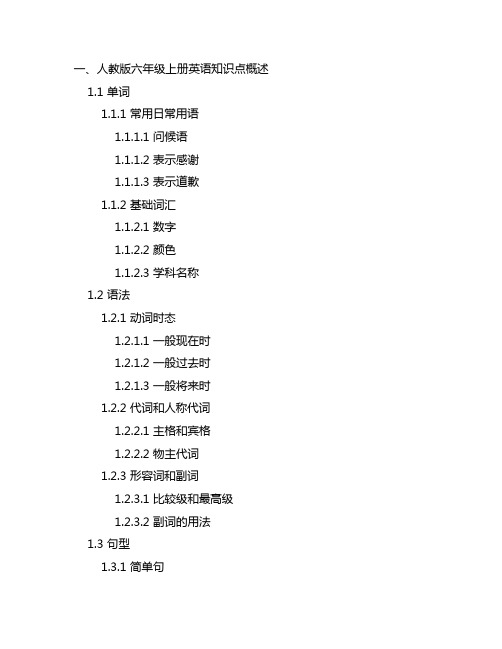
一、人教版六年级上册英语知识点概述1.1 单词1.1.1 常用日常用语1.1.1.1 问候语1.1.1.2 表示感谢1.1.1.3 表示道歉1.1.2 基础词汇1.1.2.1 数字1.1.2.2 颜色1.1.2.3 学科名称1.2 语法1.2.1 动词时态1.2.1.1 一般现在时1.2.1.2 一般过去时1.2.1.3 一般将来时1.2.2 代词和人称代词1.2.2.1 主格和宾格1.2.2.2 物主代词1.2.3 形容词和副词1.2.3.1 比较级和最高级1.2.3.2 副词的用法1.3 句型1.3.1 简单句1.3.1.1 肯定句1.3.1.2 否定句1.3.1.3 疑问句1.3.2 复合句1.3.2.1 并列句1.3.2.2 定语从句1.3.2.3 状语从句二、人教版六年级上册英语知识点详解2.1 单词2.1.1 常用日常用语2.1.1.1 问候语问候语是指在英语日常交际中用于打招呼和示好的常用词汇,包括Hello、Hi、Good morning、Good afternoon等等。
2.1.1.2 表示感谢表示感谢的常用词汇有Thank you、Thanks a lot、Thank you very much等,用于表达对别人的帮助或礼物表示感激之情。
2.1.1.3 表示道歉表示道歉的词汇包括I'm sorry、Excuse me、Pardon等,在日常生活中,用于向别人道歉或请求对方让步的场合。
2.1.2 基础词汇2.1.2.1 数字数字是英语基础词汇的重要部分,包括基本的数字表达方式和计量单位,如one、two、three等,以及hundred、thousand等。
2.1.2.2 颜色颜色是描述事物外观的重要词汇,在日常交流中也经常用到,包括red、blue、yellow等常见颜色词汇。
2.1.2.3 学科名称学科名称涉及到人们日常生活和学习工作的方方面面,包括mathematics、music、art等,是学习英语时必须掌握的词汇。
六年级上册英语书人教版精通
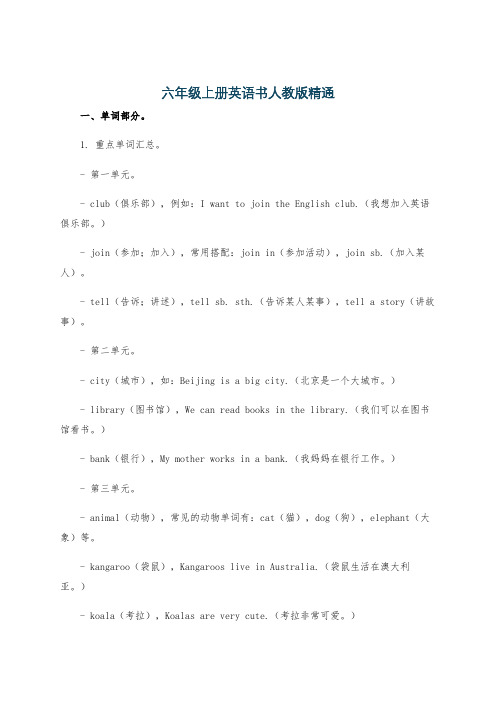
六年级上册英语书人教版精通一、单词部分。
1. 重点单词汇总。
- 第一单元。
- club(俱乐部),例如:I want to join the English club.(我想加入英语俱乐部。
)- join(参加;加入),常用搭配:join in(参加活动),join sb.(加入某人)。
- tell(告诉;讲述),tell sb. sth.(告诉某人某事),tell a story(讲故事)。
- 第二单元。
- city(城市),如:Beijing is a big city.(北京是一个大城市。
)- library(图书馆),We can read books in the library.(我们可以在图书馆看书。
)- bank(银行),My mother works in a bank.(我妈妈在银行工作。
)- 第三单元。
- animal(动物),常见的动物单词有:cat(猫),dog(狗),elephant(大象)等。
- kangaroo(袋鼠),Kangaroos live in Australia.(袋鼠生活在澳大利亚。
)- koala(考拉),Koalas are very cute.(考拉非常可爱。
)- 第四单元。
- hobby(爱好),My hobby is painting.(我的爱好是绘画。
)- reading(阅读),He likes reading books.(他喜欢读书。
)- dancing(跳舞),She is good at dancing.(她擅长跳舞。
)- 第五单元。
- country(国家),China is a great country.(中国是一个伟大的国家。
)- Australia(澳大利亚),There are many unique animals in Australia.(澳大利亚有很多独特的动物。
)- Canada(加拿大),Canada is famous for its maple leaves.(加拿大以枫叶闻名。
人教精通版6年级上下册重点单词和句型默写
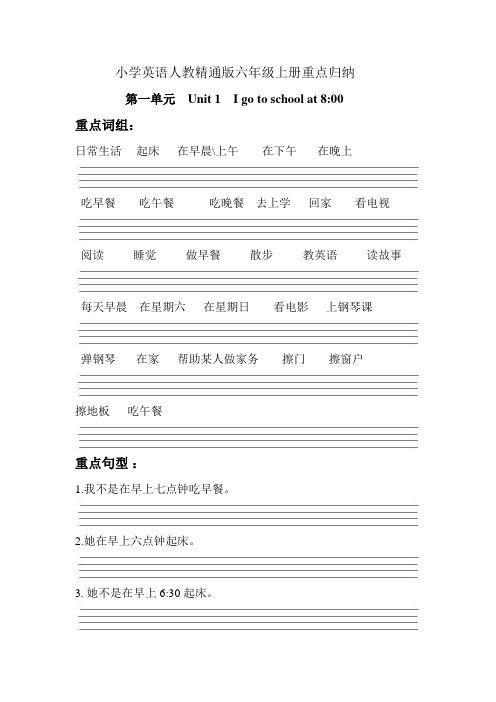
小学英语人教精通版六年级上册重点归纳第一单元Unit 1 I go to school at 8:00重点词组:日常生活起床在早晨\上午在下午在晚上吃早餐吃午餐吃晚餐去上学回家看电视阅读睡觉做早餐散步教英语读故事每天早晨在星期六在星期日看电影上钢琴课弹钢琴在家帮助某人做家务擦门擦窗户擦地板吃午餐重点句型:1.我不是在早上七点钟吃早餐。
2.她在早上六点钟起床。
3. 她不是在早上6:30起床。
4.凯特在周六做什么?5. 她通常弹钢琴。
6.我在7:30吃早饭。
7.我在12:00吃午饭。
8.我在6:00吃晚餐。
9.你在周六干什么?10.我经常去看电影。
第二单元Unit 2 What's your hobby? 重点词组:1. 一辆新的玩具汽车2. 看一看3. 收集玩具汽车4. 收集邮票5.收集地图6. 收集卡片7. 看8. 种花9. 喝中国茶10. 去钓鱼11. 做饭12. 对……感兴趣13. 做布娃娃14. 玩电脑游戏15. 照相16.照顾好17. 谈论18.打篮球19. 寻找20. 在冬天21. 从……到……22. 在夜间23. 在世界上重点句型:1. 你爷爷的爱好是什么?2. 他的爱好是钓鱼。
3. 你对什么感兴趣?4.我对拍照感兴趣。
5. 你的爱好是什么?6. 我的爱好是收集地图。
6. 你爸爸的爱好是什么?7. 他的爱好是种花。
第三单元Unit 3 Would you like to come to my birthday party?重点词组:生日聚会放学后邀请卡邀请朋友参加聚会与朋友庆祝生日向朋友赠送生日贺卡星形蛋糕心形蛋糕水果派\水果馅饼点蜡烛唱生日歌许愿吹蜡烛切蛋糕吃蛋糕一块蛋糕重点句型:1. 你想要什么种类的蛋糕?2.我想要一个心形的蛋糕。
3. 他们怎么庆祝生日的?4. 首先,他们点燃蜡烛,然后……5.你愿意来我的生日晚会吗?6. 当然,我愿意。
7. 再见。
8.我能吃些冰激凌吗?9. 这个生日蛋糕师送给你的。
(完整版)人教版六年级英语上册各单元知识点汇总,推荐文档
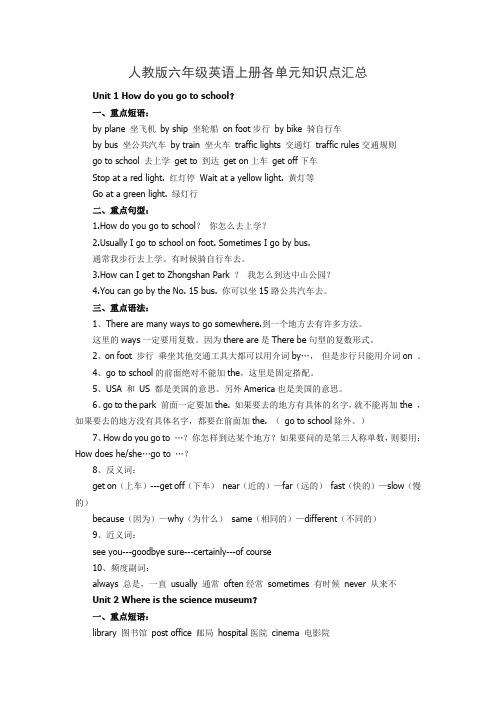
人教版六年级英语上册各单元知识点汇总Unit 1 How do you go to school?一、重点短语:by plane 坐飞机by ship 坐轮船on foot步行by bike 骑自行车by bus 坐公共汽车by train 坐火车traffic lights 交通灯traffic rules交通规则go to school 去上学get to 到达get on上车get off下车Stop at a red light. 红灯停Wait at a yellow light. 黄灯等Go at a green light. 绿灯行二、重点句型:1.How do you go to school?你怎么去上学?ually I go to school on foot. Sometimes I go by bus.通常我步行去上学。
有时候骑自行车去。
3.How can I get to Zhongshan Park ?我怎么到达中山公园?4.You can go by the No. 15 bus. 你可以坐15路公共汽车去。
三、重点语法:1、There are many ways to go somewhere.到一个地方去有许多方法。
这里的ways一定要用复数。
因为there are是There be句型的复数形式。
2、on foot 步行乘坐其他交通工具大都可以用介词by…,但是步行只能用介词on 。
4、go to school的前面绝对不能加the,这里是固定搭配。
5、USA 和US 都是美国的意思。
另外America也是美国的意思。
6、go to the park 前面一定要加the. 如果要去的地方有具体的名字,就不能再加the ,如果要去的地方没有具体名字,都要在前面加the. (go to school除外。
)7、How do you go to …?你怎样到达某个地方?如果要问的是第三人称单数,则要用:How does he/she…go to …?8、反义词:get on(上车)---get off(下车)near(近的)—far(远的)fast(快的)—slow(慢的)because(因为)—why(为什么)same(相同的)—different(不同的)9、近义词:see you---goodbye sure---certainly---of course10、频度副词:always 总是,一直usually 通常often经常sometimes 有时候never 从来不Unit 2 Where is the science museum?一、重点短语:library 图书馆post office 邮局hospital医院cinema 电影院bookstore书店science museum科学博物馆turn left向左转turn right 向右转go straight 直行north北south南east东west西next to靠近、与……。
人教精通版小学英语六年级上册单元知识点总结(全册)(完美版)

Unit1Igotoschoolat8:00.一、核心词汇1.描述日常活动的词汇cleanthewindow擦窗户cleanthedoor擦门cleanthefloor擦地板2.描述三餐的词汇breakfast早餐lunch午餐dinner晚餐3.描述时间的词汇morning早晨afternoon下午evening晚上; 傍晚4.频率副词often时常; 常常5.其他walk走; 步行every每一个easy容易difficult困难二、拓展词组描述日常活动的词组getup起床havebreakfast吃早餐gotoschool去上学havelunch吃午饭gohome回家havedinner吃晚饭watchTV看电视gotobed睡觉cookbreakfast做早餐teachEnglish教英语takeawalk散步readstories读故事seeafilm看电影playthepiano弹钢琴三、核心句型1.Igetupat7:30inthemorning. 我早晨七点半起床。
解读:此句是一个陈述句, 用来描述我在某一时刻所做的事情。
举一反三:Igotoschoolat8:00inthemorning. 我早晨八点去上学。
她不在上午六点半起床。
2.Shedoesn’tgetupat6:30inthemorning.解读: 此句是一个否定句, 用来描述某人在某一时刻没有做的事情。
举一反三:Shedoesn’tgetupat6:40.她不在六点四十分起床。
3.— WhatdoyoudoonSaturdays? 你星期六做什么?— Ioftengoandseeafilmwithmyparents. 我经常和我的父母一起去看电影。
解读:这是用来询问对方某天做什么及其回答的句子。
举一反三:— Whatdoyoudoontheweekend? 你周末做什么?— Ioftendohomework. 我经常做作业。
小学英语人教精通版六年级上册重点归纳

小学英语人教精通版六年级上册重点归纳第一单元Unit 1 重点单词:lunch 午餐every 每一个evening 晚上difficult困难重点词组:1. daily life 日常生活3. in the morning 在早晨上午5. in the evening 在晚上7. have lunch 吃午餐walk 走;步行afternoon 下午easy容易2. get up 起床4. in the afternoon 在下午6. have breakfast 吃早餐8. have dinner 吃晚餐10. go home 回家12. do some reading 阅读14. cook breakfast 做早餐16. teach English 教英语18. every morning 每天早晨20. on Sundays 在星期日22. have Pia no IeSS OnS 上钢琴课24. at home 在家25. help sb. to do the housework帮助某人做家务26. clea n the door扌察门27. clean the window 擦窗户I go to school at 8:00dinner 晚餐morning 早上often时常;常常9. go to school 去上学11. watch TV 看电视13. go to bed 睡觉15. take a walk 散步17. read stories 读故事19. on Saturdays 在星期六21. see a film 看电影23. play the piano 弹钢琴28. clean the floor 擦地板重点句型:1.I don'h t ave breakfast at 7:00 in the morning .我不是在早上七点钟吃早餐。
2.She gets up at 6:00 in the morning 她. 在早上六点钟起床。
人教精通版小学英语六年级上册重点归纳
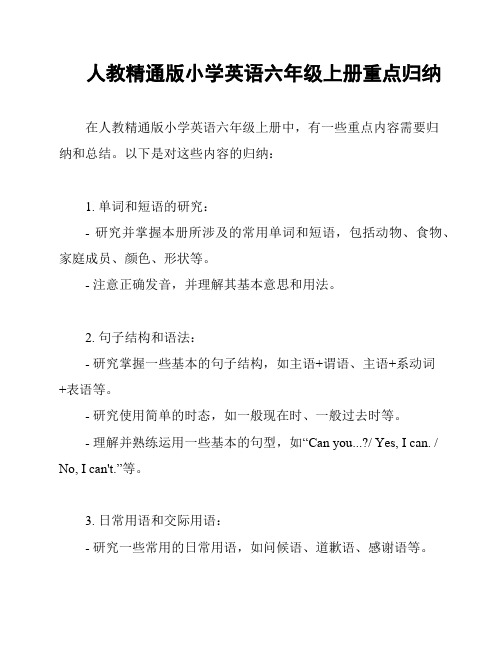
人教精通版小学英语六年级上册重点归纳
在人教精通版小学英语六年级上册中,有一些重点内容需要归
纳和总结。
以下是对这些内容的归纳:
1. 单词和短语的研究:
- 研究并掌握本册所涉及的常用单词和短语,包括动物、食物、家庭成员、颜色、形状等。
- 注意正确发音,并理解其基本意思和用法。
2. 句子结构和语法:
- 研究掌握一些基本的句子结构,如主语+谓语、主语+系动词
+表语等。
- 研究使用简单的时态,如一般现在时、一般过去时等。
- 理解并熟练运用一些基本的句型,如“Can you...?/ Yes, I can. / No, I can't.”等。
3. 日常用语和交际用语:
- 研究一些常用的日常用语,如问候语、道歉语、感谢语等。
- 研究并练简单的交际用语,如问答基本信息、提出请求、表达意见等。
4. 阅读理解:
- 阅读短文或简单的对话,理解其中的基本内容和信息。
- 掌握提取关键信息的技巧,如找出主题句、主要人物等。
5. 听力训练:
- 听取简短的对话或句子,理解其基本意思。
- 提高听力技巧,包括听清语音、辨别关键词等。
6. 书写和拼写:
- 研究正确书写和拼写常见的单词和短语。
- 注意字母大小写和书写规范。
以上是人教精通版小学英语六年级上册的重点归纳。
通过研究这些内容,可以提高英语听、说、读、写的能力,为接下来的研究打下基础。
> *注意:上述内容为总结归纳,具体细节和例句可详细阅读教材内容。
*。
- 1、下载文档前请自行甄别文档内容的完整性,平台不提供额外的编辑、内容补充、找答案等附加服务。
- 2、"仅部分预览"的文档,不可在线预览部分如存在完整性等问题,可反馈申请退款(可完整预览的文档不适用该条件!)。
- 3、如文档侵犯您的权益,请联系客服反馈,我们会尽快为您处理(人工客服工作时间:9:00-18:30)。
完整版)小学英语人教精通版六年级上册重点归纳Key Words:lunch。
dinner。
walk。
every。
morning。
afternoon。
evening。
often。
easy。
difficultKey Phrases:daily life。
get up。
in the morning。
in the afternoon。
in the evening。
have breakfast。
have lunch。
have dinner。
go to school。
go home。
watch TV。
do some reading。
go to bed。
cook breakfast。
take a walk。
teach English。
read stories。
every morning。
on Saturdays。
on Sundays。
see a film。
have piano lessons。
play the piano。
at home。
help sb。
to do the housework。
clean the door。
clean the window。
clean the floorKey Sentences:1.I don't have breakfast at 7:00 in the morning.2.She gets up at 6:00 in the morning.3.She doesn't get up at 6:30 in the morning.4.What does Kate do on Saturdays?5.She usually plays the piano.6.I have breakfast at 7:30.In daily life。
we have three meals a day: lunch。
dinner。
and breakfast。
We often walk to school。
work。
or other places。
Every morning。
we get up and start our day。
In the afternoon。
we may have classes or work to do。
In the evening。
we can relax and watch TV or do some reading before we go to bed.Some activities we do regularly include having breakfast。
lunch。
and dinner。
We also go to school or work。
and go home after。
On Saturdays and Sundays。
we may see a film or have piano lessons。
At home。
we can play the piano。
read stories。
or teach English.In order to keep our homes clean。
we may help others to do housework。
such as cleaning the door。
window。
or floor。
Some things are easy to do。
while others are difficult。
It'simportant to have a routine and stick to it。
like having breakfast ata certain time every day.7.I have lunch at 12:00 every day。
8.I usually eat dinner at 6:00 in the evening。
9.How do you usually spend your Saturdays。
10.I am a big fan of watching movies and I often go to the cinema.Unit 2: What's Your Hobby?Key Vocabulary:Open: to unlock or unsealHobby: an activity done regularly for enjoymentCollect: to gather or accumulateMap: a visual n of an areaBox: a container made of wood。
cardboard。
or plasticColour: the visual appearance of an objectDad: a fatherMum: a motherPlant: a living organism that grows in soilFlower: a colorful plant that bloomsDrink: to consume a liquidTea: a hot beverage made from leavesTake: to pick up or grabPhoto: a picture taken with a cameraKid: a child or young personBaby: a very young childHungry: feeling the need to eatCry: to shed tears as a result of nal distressKey Phrases:1.A new toy car: a recently acquired miniature vehicle2.Have a look: to examine or inspect3.Collect toy cars: to gather and accumulate miniature vehicles4.Collect stamps: to gather and accumulate postage stamps5.Collect maps: to gather and accumulate visual ns of areas6.Collect picture cards: to gather and accumulate illustrated cards7.Look at: to observe or examine8.Plant flowers: to sow and grow colorful plants9.Drink Chinese tea: to consume a hot beverage made from Chinese tea leaves10.Go fishing: to engage in the activity of catching fish11.Cook meals: to prepare food for n12.Be interested in: to have a sity or desire to learn more about something13.Make dolls: to create miniature human figures made of cloth or other materials14.Play computer games: to engage in video games played ona computer15.Take photos: to capture images with a camera16.Take good care of: to provide proper n and care17.Talk about: to discuss or converse about18.Play basketball: to engage in the sport of basketball19.Look for: to search or seek20.From。
to。
: indicating a range or span21.At night: during the evening hoursKey Sentence Structures:1.What is your grandpa's hobby。
2.His hobby is fishing。
3.What are you interested in。
4.I am interested in taking photos。
5.What is your hobby。
6.My hobby is collecting maps。
7.What is your dad's hobby?Here's a birthday cake for you。
Celebrate your special day with your friends by inviting them to your party。
Don't et to give a birthday card to your friend as well.In this unit。
we will learn about the months of the year and some important holidays and events。
January is the first month of the year。
followed by February。
New Year's Day and Spring Festival are celebrated during these months。
In March。
we have Tree Planting Day。
and in April。
we celebrate Easter。
May is the month for Labor Day and Mother's Day。
while June is when we celebrate Children's Day and Father's Day。
During these holidays。
it's a great time to plant trees or go on a trip.Some useful phrases to remember include "in the south of China," "all day," and "take a photo." So remember。
